2018 International Youth Leadership Finance Summit (2018 IYLFS) organized by Shanghai Jiao Tong University Shanghai Advanced Institute of Finance (SAIF) Master of Finance (MF) Program successfully rang down its curtain in Shanghai on January 30th, 2018. Centering on the hotspot domain of FinTech and exchanged on the three areas of Robo-advisor, Digital Mining and Blockchain, the event attracted over 1,000 participants from world-class institutions, including not only local C9 and 985 universities like Peking University, Tsinghua University, Zhejiang University, Nankai University, Fudan University and Shanghai Jiao Tong University, but also international schools, such as London School of Economics and Political Science, University of Toronto, University of Waterloo, Pennsylvania State University, University of British Columbia, National University of Singapore, University of Hong Kong, The Chinese University of Hong Kong, Taiwan University and National Chengchi University. A compound word of Finance and Technology, the term “FinTech” refers to high and new technologies that will change the way how traditional financial sector serves the world.
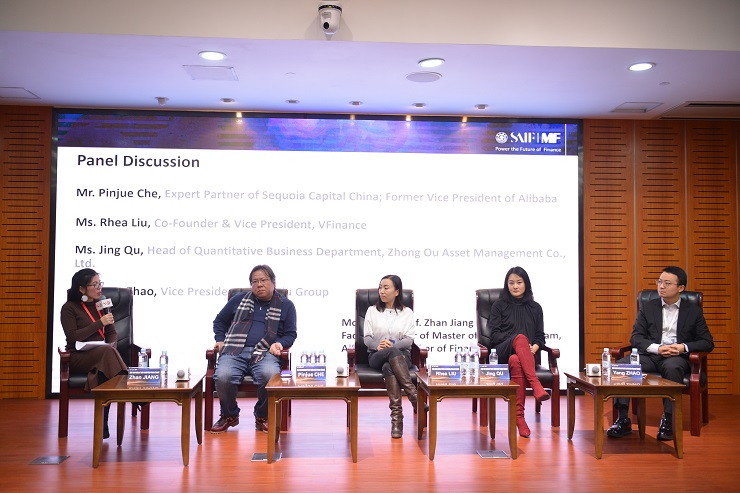
On the first day of the competition, the panel discussion chaired by Prof. Zhan Jiang, Faculty Director of Master of Finance Program and Associate Professor of Finance at SAIF witnessed the insights shared by Mr. Pinjue Che, Expert Partner of Sequoia Capital China; Former Vice President of Alibaba Group; Ms. Rhea Liu, Co-Founder & Vice President, VFinance; Ms. Jing Qu, Head of Quantitative Business Department, Zhong Ou Asset Management Co., Ltd.; and Mr. Yang Zhao, Senior Vice President, Kuai Niu Group. It also provided an opportunity of face-to-face exchange with academic and business leaders to the participants.
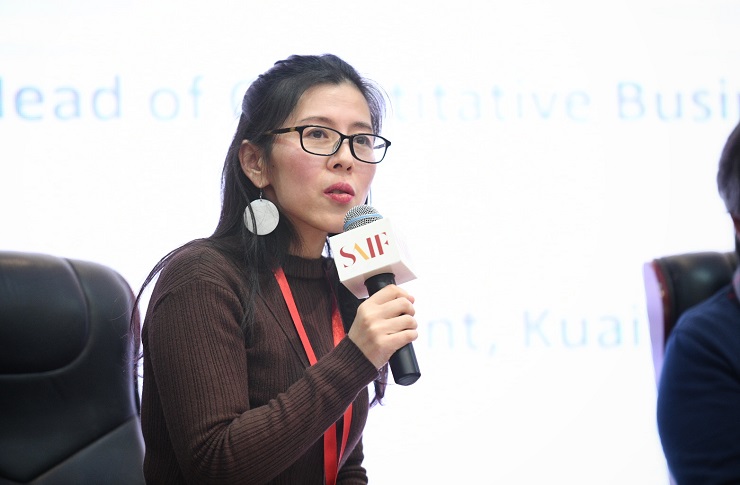
Prof. Zhan Jiang, Faculty Director of SAIF MF Program, hosted the panel discussion
The panelists interpreted the concept of FinTech from their own perspectives and what kind of changes FinTech will bring to the financial sector based on years of experience and practice. Mr. Che from Sequoia Capital China had started his career and spent six years at The Hong Kong and Shanghai Banking Corporation Limtied (HSBC) before he felt “everything had remained the same over the years, which was so boring”. “So why FinTech today imposes such a huge impact on the world of finance? Because the conventional financial sector hasn’t changed for decades.” Mr. Che illustrated that in a traditional bank, it requires at least five signatures to use a small amount of data for anlaysis. In contrast, at Alibaba, all kinds of innovative data applications keep emerging. It even predicts which key employee is likely to leave the group based on big data. One of the essential factors is that an employing looking forward to quitting his/her job often calculates the value of his/her options.
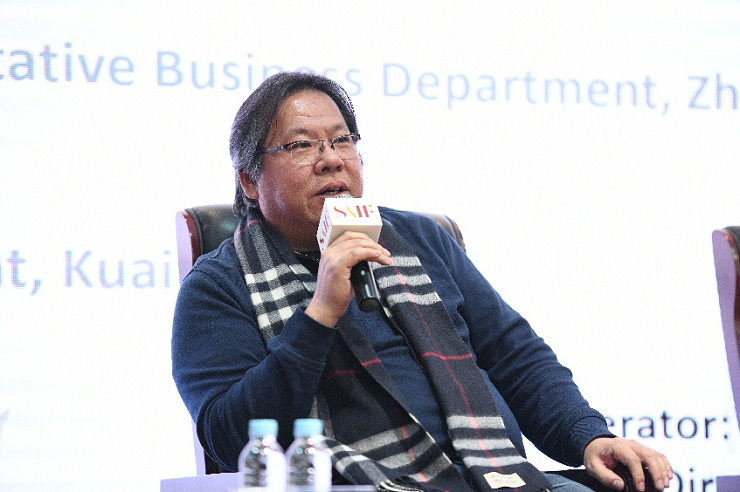
Mr. Pinjue Che, Expert Partner of Sequoia Capital China
Ms. Qu from Zhong Ou Asset Management commented the mutual fund business, “We are a traditional financial institution and in many cases, we face not only opportunities but also risks.” She explained, “Standing at the first line of investment, many years ago, we already understood that the sales data of distributors were derived from grassroot research. Today, the adoption of big data tools and statistics has substantially improved the efficiency of investment research.” From these big data related to sales, a fund manager is able to identify the business results of some consumer products and also precisely review the details and unit price distribution of SKUs. With these data, the investments are more surefooted and predictable.
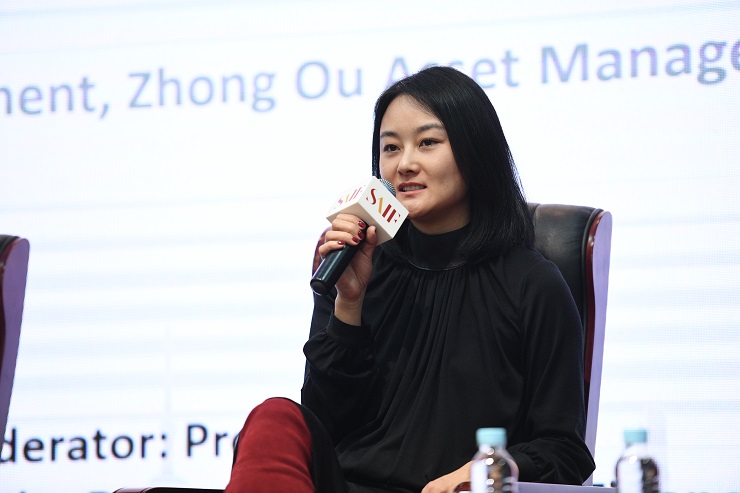
Ms. Jing Qu, Head of Quantitative Business Department, Zhong Ou Asset Management Co., Ltd.
The panelists also shared their solutions against the changing landscape. Mr. Zhao was quite confident, “We work with four industry leaders, namely Baidu, Alibaba, Tencent and JD.com (BATJ), in terms of data collaboration. Though the models are hosted at the local servers of the individual company, we provide services through joint modeling.” Traditionally, a bank collected all the information of a customer in a single datasheet, no matter it intends to grant a loan facility or recommend a wealth management product. Do you think it’s sufficient? Not at all. “Now that we have FinTech and big data, we understand you better, concerning your risk appetite and consumer behaviors. Based on data analytics, we make the best decisions, such as what kind of financial products to sell or how much your loan facility will be granted,” said Mr. Zhao.
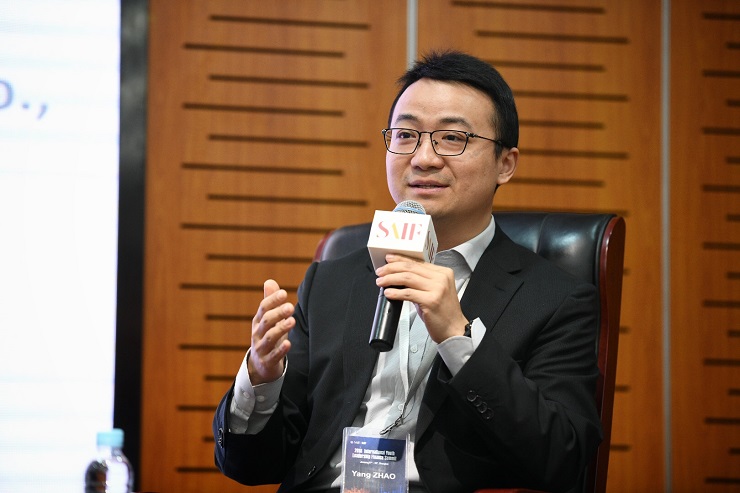
Mr. Yang Zhao, Senior Vice President, Kuai Niu Group
Prof. Jiang highlighted the importance of regulation in the evolution of FinTech, which provides both positive effects and certain restrictions. Ms. Liu from VFinance noted that for a company, it is essential to understand the nature of regulation and the implication behind a policy, which helps it take account of regulation into its product design and development. Meanwhile, innovations with such considerations are more likely to be approved by regulators. For example, VFinance’s account and payment clearing system rapidly and accurately makes payment to various payees based on established rules. In compliance with regulatory requirements, it provides a solution to many companies under tightening regulation. In contrary, Mr. Zhao called for “real changes”, “We actively embrace regulation, because regulation makes us awe finance. We go to two directions in response to regulation. One is tighter and the other is looser. We need to prepare for both ways.”
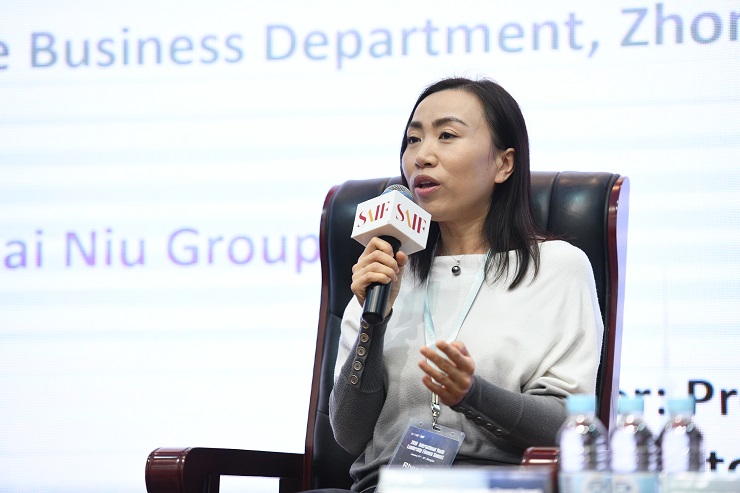
At the end of the session, the panelists also conveyed their expectations on the players. Ms. Qu pointed out, “I think logical thinking is vital to all careers, in particular those in the financial sector, which helps you decide whether the cause and effect are reasonable, or whether what you are told is justified. If you have no professional experience, we can teach you from A to Z. However, logical thinking cannot be taught.”
Mr. Che advised the players to focus on a few key points: can your concern be solved today? If solved, does it create investment return? And can you access necessary data? He smile, “According to my peers, big data and AI are helpful in two areas, namely how to acquire customers in a cost-effective manner and how to price a product.”
Ms. Liu encouraged the students to keep on thinking and looking out no matter in which area of the financial sector. “I believe that AI is a vehicle, which cannot completely replace a number of jobs. We can drive ourselves and the world by thinking.”
Mr. Zhao recalled his school days. At the time of his junior high, you were way ahead of others if you knew how to use a computer. When he graduated from college, there were plenty of job opportunities if you boasted some skills of data mining. “But it is different nowadays. A few days ago, my 6-year-old daughter asked my to buy an app of programming tutorial on her iPad. In short, how can you surpass most of your peers when a particular skill is common?” This question may trigger some inspiring thoughts among all participants.
About 2018 IYLFS
2018 International Youth Leadership Finance Summit (2018 IYLFS) centered on the hotspot domain of FinTech and exchanged on the three areas of Robo-advisor, Data Mining and Blockchain. The final competition focused on four topics of “Rotation Strategy within the Banking Sector”, “Design of Blockchain Application”, “Quantitative Asset Allocation Using Black-Litterman Model” and “Credit Risk Model for Individual Loan”.
After several rounds of keen competition, 130 outstanding undergraduates from 25 top-class universities and colleges across the world were shortlisted in the final among over 1,000 participants from world-class institutions, including not only local C9 and 985 universities like Peking University, Tsinghua University, Zhejiang University, Nankai University, Fudan University and Shanghai Jiao Tong University, but also international schools, such as London School of Economics and Political Science, University of Toronto, University of Waterloo, Pennsylvania State University, University of British Columbia, National University of Singapore, University of Hong Kong, The Chinese University of Hong Kong, Taiwan University and National Chengchi University.
Launched by SAIF MF Program in 2013, IYLFS is designed to providing a platform of collective learning and advancement for students from all kinds of higher education institutions, which will foster their capabilities of communication and organization. Moreover, it also aims to improving their understanding on financial theories and practices through presentation, competition and face-to-face dialogue with business leaders and scholars in the financial sector.







